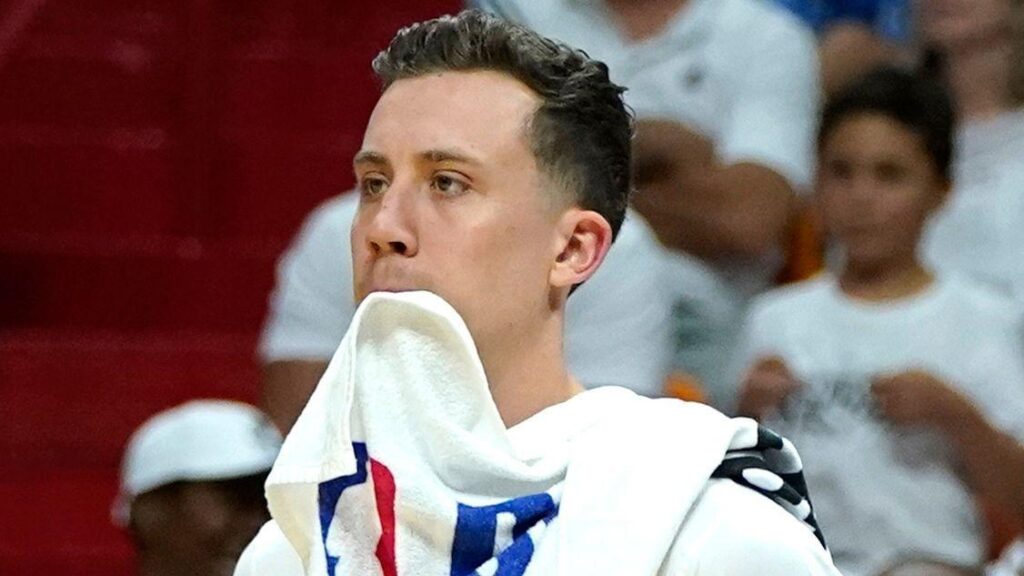
They wound up speaking on the same subject on the same day, which at least means that while Duncan Robinson fell out of the Miami Heat’s rotation during the playoffs, he never distanced himself from the team’s messaging.
So there was Heat President Pat Riley, as the focus in the interview room at FTX Arena, spelling out his expectations going forward for the team’s former starting shooting guard that he rewarded with a $90 million, five-year contract last summer.
“Duncan can improve,” Riley said in the wake of his team falling one victory short of the NBA Finals. “That message has been delivered to him many times.”
That same day, Robinson, during the taping of his The Long Shot podcast, was addressing that very message.
“I do feel like a good amount of the responsibility is on me, to like shore up areas, weaknesses that can be exposed in high-level competition,” he said during a reflective moment on his podcast. “With that being said, I do still feel like my best version and what I’m capable of can absolutely contribute to the highest level and winning a championship.”
As he spoke, Robinson mentioned how opponents openly wondered to him during the Heat’s run through three rounds of the playoffs why he had fallen out of the rotation.
“I think we become a little easier to prepare for,” he said of the team’s offense having moved away from his constant movement to set up 3-point shots for himself and spacing for teammates. “What I do, it’s like a curveball, in terms of traditional offense.”
But in reducing Robinson’s role to the degree that he was held out of five playoff games due to “coach’s decision” and utilized in six others for nine minutes or fewer, Erik Spoelstra clearly had moved away from Robinson’s defensive limitations.
To that end, Robinson also was reflective, reserving his thoughts for his podcast after bypassing the Heat’s season-ending interview session.
“Slow feet do not eat,” Robinson said with a laugh. “I’ve got to get my feet faster.”
By season’s end, the coaching staff’s confidence was not only with replacement starter Max Strus, but reserves such as Victor Oladipo, Gabe Vincent and Caleb Martin seemingly were prioritized ahead of Robinson.
The shift away from Robinson was sudden and dramatic. After starting 140 games the previous two seasons, he started 67 of his first 72 appearances and then only twice more after March 26.
“That’s also just like the nature of a season, sometimes,” he said. “Things kind of ebb and flow and change. That’s why I ultimately feel like the responsibility falls on myself to not be in that situation, not put myself in that situation again, as to where it has to be non-negotiable that I’m out there.
“And I have empathy and compassion for people like Spo. Obviously he’s coached at the highest level.”
So again this offseason, there will be work on his body, work on his deficits.
He wants back what he once had, what he again believes is attainable.
“It’s one of those things I can’t dwell on, but I can definitely not forget,” he said of how all practically turned into nothing. “I’m trying to shift my perspective, that like now, with the offseason, I have this incredible opportunity with this newly built-in, packed-in motivation. Motivation, saying it’s an all-time high would probably be an understatement.”
All as uncertainty swirls.
Earning $16.9 million next season, Robinson holds a salary that could be in a sweet spot as a matching salary in a trade. Or the Heat could move on from Tyler Herro or lose Victor Oladipo in free agency, possibly opening the door for a return to the rotation.
“After all the just trash, garbage, noise out there,” Robinson said, “I feel like I’m actually in a place where I think I’m channeling in a healthy way, or I’m eager to see if I’m channeling in a healthy way.
“This offseason I really feel will be a special one.”
()
